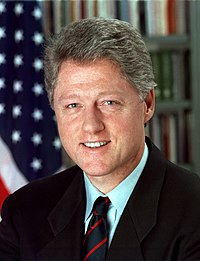
Back ديمقراطيون جدد Arabic Nuevos demócratas Spanish دموکراتهای نو Persian Uudet demokraatit Finnish Nouveaux démocrates French New Democrats Italian Novos Democratas Portuguese Новые демократы (США) Russian New Democrats SIMPLE Нове демократе Serbian

New Democrats, also known as centrist Democrats, Clinton Democrats, or moderate Democrats, are a centrist ideological faction within the Democratic Party in the United States. As the Third Way faction of the party, they are seen as culturally liberal on social issues while being moderate or fiscally conservative on economic issues.[1] New Democrats dominated the party from the late 1980s through the early-2010s,[2] and continue to be a large coalition in the modern Democratic Party.[3][4]
With the rise of progressivism in 2016 and 2020,[5] and that of the right-wing populism of Donald Trump,[6] New Democrats began to change and update their ideological positions.[7][8][9] Debates over tax cuts on capital gains have been reconfigured to removing caps on state and local tax deduction (SALT).[10][11]
Despite expansion of the Congressional Progressive Caucus (CPC), even with stricter criteria for CPC representation in Congress, the New Democrats' Progressive Policy Institute (established in 1989) persists into the present day, sponsoring "young pragmatists" at the rechristened Center for New Liberalism, formerly known as the Neoliberal Project, to "modernize progressive politics".[12] In 2024, the CPC lost four seats in the overarching House Democratic Caucus, although the number of members in the CPC remained the same. At least two out of nine CPC freshmen planned to also hold seats in the New Democrat Coalition (NDC) as well, joining an additional twenty-two House Democrats who similarly claimed membership in both caucuses. The NDC lost approximately five members, yet gained twenty-three, reestablishing the coalition as the leading Democratic partisan caucus in Congress.[13][14]
Brad Schneider, chief architect of cap removals from the SALT deductions, is NDC chairman in the 119th United States Congress over rival Sharice Davids. Schneider endorsed a rival candidate for the position, Sharice Davids, as Honorary Chair of the NDC ReNew Democracy Foundation (distinct from the Renew Democracy Initiative).[15][16] In the aftermath of the loss in the 2024 United States presidential election, the CPC and NDC continue to debate the future of the Democratic Party.[10][17][18]
- ^ Cite error: The named reference
Loewe 2010was invoked but never defined (see the help page). - ^ Kane, Paul (January 15, 2014). "Blue Dog Democrats, whittled down in number, are trying to regroup". The Washington Post. Archived from the original on January 16, 2014. Retrieved July 23, 2014.
Four years ago, they were the most influential voting bloc on Capitol Hill, more than 50 House Democrats pulling their liberal colleagues to a more centrist, fiscally conservative vision on issues such as health care and Wall Street reforms.
- ^ Yglesias, Matthew (July 26, 2016). "Bill Clinton is still a star, but today's Democrats are dramatically more liberal than his party". Vox. Retrieved May 31, 2022.
- ^ Graham, David A. (November 5, 2018). "How Far Have the Democrats Moved to the Left?". The Atlantic. Retrieved January 4, 2019.
- ^ Grim, Ryan (October 26, 2020). "Congressional Progressives Are Revamping Their Caucus With an Eye Toward 2021". The Intercept.
- ^ Cite error: The named reference
Gerstle2022was invoked but never defined (see the help page). - ^ Steinhauer, Jennifer (October 8, 2012). "Weighing the Effect of an Exit of Centrists". The New York Times. Retrieved January 5, 2019.
- ^ Podkul, Alexander R.; Kamarck, Elaine (September 14, 2018). "What's happening to the Democratic Party?". Brookings Institution. Retrieved January 4, 2019.
- ^ Marans, Daniel (November 27, 2018). "The Progressive Caucus Has A Chance To Be More Influential Than Ever". The Huffington Post. Retrieved January 17, 2025.
That would bring the caucus' total to 96 members, or about 40 percent of the House Democratic Caucus ― by far the largest bloc in the party.
- ^ a b Lillis, Mike (November 9, 2024). "Democrats' election reckoning pits liberals against centrists". The Hill. Retrieved January 17, 2025.
- ^ Rubin, Richard (November 4, 2024). "The SALT Deduction Fight Is Coming Back—Whoever Wins the Election". The Wall Street Journal. Retrieved January 17, 2025.
- ^ Mortimer, Colin (February 10, 2020). "Release: Young Neoliberals Link Up With PPI". Progressive Policy Institute. Retrieved January 17, 2025.
- ^ "Congressional Progressive Caucus Welcomes New Members-Elect to Washington Ahead of 119th Congress". Congressional Progressive Caucus. November 11, 2024. Retrieved January 17, 2025.
- ^ "New Democrat Coalition Elects New Leadership and Inducts 23 New Members Ahead of 119th Congress". New Democrat Coalition. November 20, 2024. Retrieved January 17, 2025.
- ^ "Sharice Davids Named Honorary Chair of New Democrat Coalition's ReNew Democracy Foundation". Representative Sharice Davids. December 12, 2024. Retrieved January 17, 2025.
- ^ Rod, Marc (September 20, 2024). "Pro-Israel stalwart Schneider vies for leadership role in key Democratic caucus". Jewish Insider. Retrieved January 17, 2025.
- ^ Otterbein, Holly; Messerly, Megan (November 10, 2024). "More Democrats fear the party's image isn't just damaged – it's broken". Politico. Retrieved January 17, 2025.
- ^ Kornfield, Meryl (November 16, 2024). "Democrats, reeling from election losses, cast blame on each other". The Washington Post. Retrieved January 17, 2025.